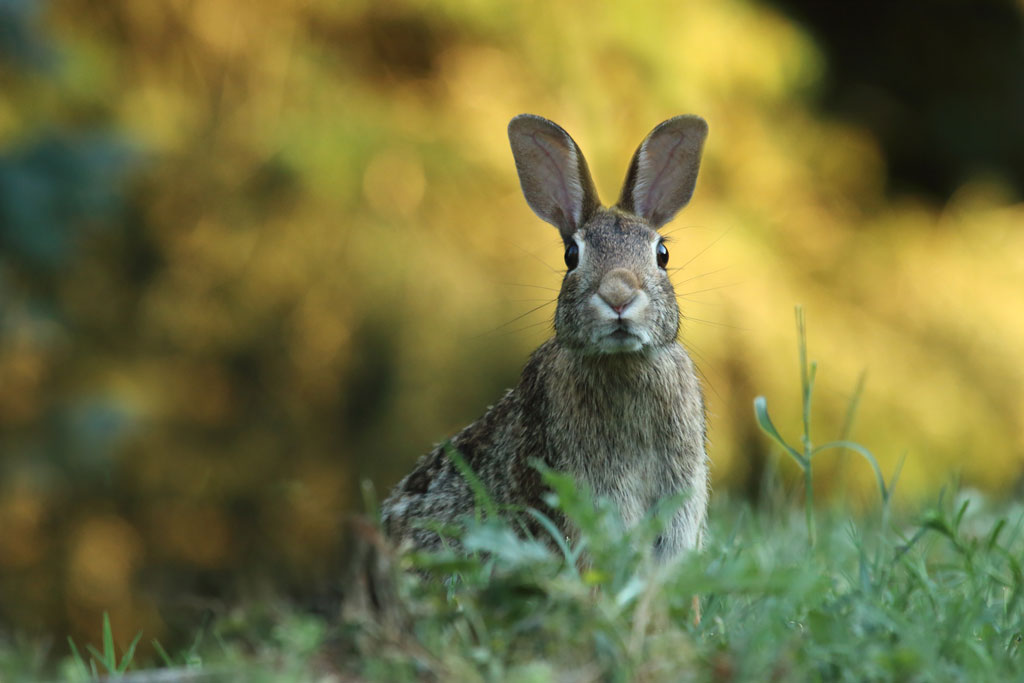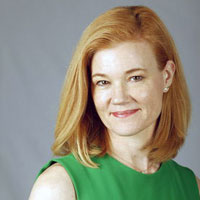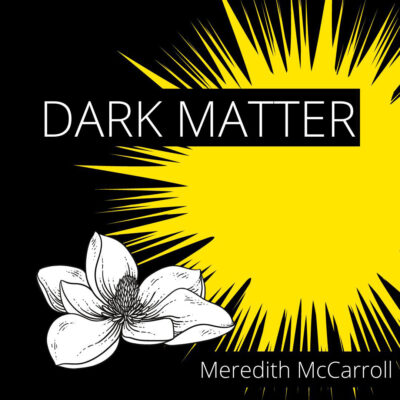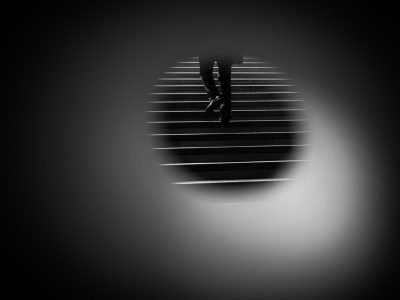
Andrea Jarrell
RABBIT, RABBIT
On the first morning after our return to the old house, I listen to Brad sleeping beside me, his full-bodied inhale and exhale bubbling slightly, like water coming to a boil. At first, I forget where I am. But fresh paint, its sharp scent in my nostrils, reminds me of this new beginning we’ve made. As I open my eyes, I remember the boxes stacked high in the living room waiting to be unpacked.
When I told the movers where to place the furniture, I was careful to set up new configurations. Brad and I agreed on that from the start. Other than the big flowered area rug and the red club chairs, most of our furnishings are different from the first time we lived here—two new blue loveseats, bookshelves, dining table, lamps. We want to move forward, not back.
In the quiet of our room now, I hold very still, fighting the urge to smooth my nightgown that’s bunched around my waist. I am trying not to disturb this man I love or the small brown eager dog and the lumbering black one sleeping on matching pads on the floor. The three of them are snoring in concert, but at any moment Brad’s alarm will sound, setting off the dogs in a melee of toenails on hardwood and jangling collars.
I want this sliver of velvet blue morning, soft as rabbit’s fur, to myself. I want time to adjust, as my eyes have done, to my surroundings: the sage green paint we’ve chosen for the long wall on Brad’s side of the bed, the new bedside tables and simple window blinds through which I can see slants of light. The new floral-patterned coverlet Brad has kicked off in his sleep.
Throughout our marriage, I have jokingly referred to him as my trophy husband because of our age difference. Half the year he is four years my junior, the other half, three. When our son was in elementary school, he thought it was hilarious that his father had been a fifth grader when his mother was an eighth grader. Today is the first day of June, so for the next two months Brad will be fifty-one to my fifty-five. Depending on my mood, our age differential makes me feel sexy or just old.
“Sometimes I’m scared of ending up a bag lady,” I’d said when we first started talking about moving. Part of a Greek chorus of fears I can hear hovering over women my age: breast cancer, losing a child, Alzheimer’s, poverty reducing us to carrying our earthly possessions in a worn-out Nordstrom bag.
But Brad and I have decided this is the year we will get serious about our future. Save our money and plan for retirement. We hope to buy a house one day to have something to leave to our children. We tried buying once before—back in Los Angeles—but at the time, we had no business being homeowners. We ended up with two mortgages right away and, ultimately, sold short and bore the tax burden for years. For us, buying has not meant security but risk, one we haven’t been willing to take again.
For the last two and a half decades, we have focused on getting our house in order in a different way—raising thoughtful kids, cultivating careers we love, making each other happy. But now we have returned to this little house, a squat, brick, 1950’s rental on the Maryland side of Washington, D.C. A house we lived in when our son and daughter were still small. We’ve arrived at its familiar red door, ready to be our older, wiser selves.
As I knew it would, the room comes alive all at once: Brad’s buzzing phone, his arm reaching to silence it, the feel of his torso see-sawing upright to the edge of the bed, dogs scrambling. I hear his pale feet with their neatly-trimmed nails shooshing along the floor. In the dim light, I see him, bare-chested in dark gym shorts, slip into the hallway. The dogs race ahead through the living room and onto the ceramic kitchen tiles. I hear the chirp of the backdoor alarm sound open as he lets them out. Then his footsteps as he descends the basement stairs, where he will settle on the little couch in his office, read his AA literature, pray and write his daily letter to God. For almost as long as we’ve been married, we’ve lived sober—Brad going to AA right before our first anniversary.
I, too, pray and write to God each morning in a slim, black journal I keep by my bedside. Sometimes I even get down on my knees the way I did as a child. I’m not sure when I stopped my nightly childhood prayers, but I know when I started them again—when we still lived in Los Angeles, when Brad first stopped drinking. My prayers are so much a part of my life now that I feel a little jolt to realize if he hadn’t gone to AA, I might not have found my own Higher Power. A God I think of as my constant companion.
We are both familiar with what those in AA call “doing a geographic.” Moving to change one’s outer surroundings in the desperate hope of fixing internal unease.
“Do you think that’s what this is?” Brad asked after we signed the new lease on our old house.
The question lingered in the air between us, as we considered it. “I think it’s the least desperate move we’ve ever made,” I finally said.
I can remember co-signing our very first lease nearly thirty years ago—a tiny Spanish-style with a tiered backyard garden near downtown L.A., where we’d eaten scrambled eggs for dinner and watched Seinfeld as we rolled coins gathered from pockets, purse bottoms, and the bowl Brad kept on his dresser. I enjoyed stacking towers of pennies, nickels, dimes, and quarters on my TV tray, the grimy film the well-traveled coins left on my fingertips. Magic money we couldn’t be too eager to cash in. Delaying long enough to feel the luck of a true windfall when the rolled coins would become green fives, tens, and twenties. At the time, I couldn’t imagine how we might grow to be people who could put kids through college, but we did.
Just last week, in fact, we were at our daughter’s graduation. Brad wearing a beautiful navy blue suit, and I in a melon lace dress ordered specially. Our ability to pay college tuitions, making good on our responsibility to our children, is what makes us believe we now have it in us to build a nest egg and secure our own future.
Coming back to this old house feels like reuniting with an ex-lover who has adopted a new hairstyle, quit smoking, updated their sex moves. The same familiar bay window and three steps leading to the front door, but new tile in the kitchen and bathrooms, new carpet in the basement. Like the aging ex-lover, the house has also seen more wear and tear. Notably, the once-smooth driveway has buckled and cracked, asphalt splitting like the top of a cake baked too long. Our move has prompted the landlord to begin the repaving process, and soon the driveway will be a curving terracotta swath.
I was disappointed when the previous tenants took out the big, leafy oak tree that once stood next to the driveway. A tree I used to be able to see from our front bedroom window. The old oak had given the modest house curb appeal, but apparently, it had been dying—perhaps the whole time our kids were growing up here, even as the tree’s root system, no doubt still underground and thriving, held a dormant seventeen-year cicada brood.
These insects had emerged not long after we first moved to Maryland. Armies of the coffee-brown bugs with their pungent sick-sweet scent burrowed up from under the tree and along the driveway. After six weeks or so, the big-eyed bugs went to ground again, their abandoned shells scattered like spent casings. At the time, I’d calculated the year they’d reemerge—when our son was twenty-one, our daughter twenty-three. A lifetime away when I’d done the math. But here we are, just a year from the next brood.
While our kids were in high school, we moved from this house and rented a bigger, nicer one a few blocks away. I’d thought the larger house signified progress, but five years flew by and still we didn’t feel like we’d quite moved in.
“We missed you!” several neighbors said, when they saw the moving truck in front of the little house yesterday. We smiled broadly at them, as if acknowledging that some misstep had now been righted.
But some friends and colleagues puzzle over our return. Only when we remind them that our kids are both out on their own do they nod knowingly. “Oh, right,” they say. “Empty nesters.”
It’s true that our life now feels more like it did before our kids were born. For one thing, we have sex in the daytime like we did before we were married. Just yesterday afternoon, in fact, after the movers had gone, I’d led Brad by the hand to this front bedroom, street traffic going by.
Pushing back the coverlet now, I step lightly to the floor and let the silky fabric of my nightgown slide back into place. Birdsong trills through the windows—a fast warble followed by a throaty thwip, thwip, thwip. I begin to make the bed, smoothing the sheets and plumping the pillows. We have kept the same big mahogany bed we had when we lived here the first time. And in this master bedroom, there is really only one way for it to fit—beneath the same window I’d looked through as a younger woman, with so much yet unknown. You think you know all about me, I can hear the house saying. You don’t know me anymore either, I want to reply.
Last night, after we’d finished the first wave of unpacking, we sat in the basement on our new charcoal gray sectional positioned in the opposite direction from the way our old navy blue couches once faced. We watched a movie in which a wife lay comatose in a hospital bed. Her grieving husband sat by her bedside helpless, hat in hand, worrying its brim. He wanted to tell this woman he loved that the world had literally opened up—that a parallel universe existed, and he’d discovered it all while she lay sleeping.
As we watched the screen, Brad turned to me and said, “I hate it when big things happen and you’re not there for me to tell.”
I scanned my memories for the big things he might be thinking of—his father’s heart attack, the job offer that originally took us East, calling me from the tarmac after the first plane hit the Twin Towers. We lived in Maine then with our children, and he’d been homeward bound from a business meeting in Los Angeles.
“Something’s happening,” he whispered into his cell phone like a cup to his lips, its string reaching all the way to my ear as I stood in the sunroom of our house in Camden, Maine, looking out at the crystal blue sky.
And what of my need to tell him big things? The car accident our daughter and I had, my stepfather’s death, my first book accepted for publication, the matching pink lines that meant I was pregnant for the first time. That Saturday morning, he’d gone to an AA meeting. When he came up the walkway to the apartment we’d lived in then, he could see me jumping up and down in the front window when I caught sight of him.
Confiding that having me witness his life is what matters may be one of the nicest things my husband has ever said to me. Because even now, even after all this time together, I need to know I am as important to him as he is to me. That he has taken up residence in me the way I have in him.
As I reach for the slim black notebook on my bedside, I whisper to no one at all, “rabbit, rabbit.” It’s a superstition Brad taught me: let these words be the first you speak on the first day of the month, and you’ll have good luck. For years, I wouldn’t play along because I didn’t want to risk forgetting and tip the balance one way or the other. But I recently took up the practice. Married for over two decades now—still in love, with good jobs and healthy kids—our winnings are piled high enough for me to place this monthly bet.
Downsizing, empty nesting—I know we could use these rational, sensible labels to explain coming back to this house. But I think our move has far more to do with the inner clockwork of our twenty-five-year marriage—a collection of decisions and choices we’ve made over the years. The way, for better and worse, our fears, shortcomings and strong suits commingle. Much of it unspoken, yet stoking the hopeful, excited way we’d looked at each other when we learned the little house we’d once lived in was vacant again.

Andrea Jarrell’s debut memoir I’m the One Who Got Away was named one of Kirkus Reviews’ “Best Books of 2017.” Her work has appeared in The New York Times “Modern Love” column, Harper’s Bazaar, Literary Hub, Narrative Magazine, the Washington Post, and many other sites, journals, and anthologies.
Image credit: Gary Bendig on Unsplash
Read more from Cleaver Magazine’s Issue #25.



